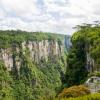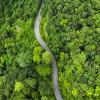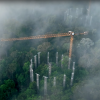
Horizon Europe project RAINFOREST kick-off meeting
With work packages led by David Leclère from the Integrated Biosphere Futures Research Group (IBF) and Thomas Schinko from the Equity and Justice Research Group (EQU), the RAINFOREST project kicked off on 19 January with a two-day workshop hosted by the project coordinator, Francesca Verones from the Norwegian University of Science and Technology (NTNU), in Trondheim, Norway. This three-year project seeks to generate new knowledge on just transformative change in EU food and biomass systems required to bend the curve on biodiversity loss and halt climate change.
Human consumption, production, and trade of food and biomass are the main underlying causes of biodiversity loss. And as demand for food and biomass rises with affluence and population growth, this threatens ecosystem service provision and, ultimately, human well-being. Three quarters of the global land area have been significantly changed, more than 80% of global wetlands have been lost, and marine systems are increasingly under pressure. The intensification and expansion of agriculture has enhanced the supply of food and biomass to a growing world population but come at a substantial cost in terms of loss of natural forests and grasslands, over-fertilization, and increasingly uniform and biodiversity-poor agro-ecosystems. These trends are responsible for a good share of both the climate and biodiversity crises, and addressing them can contribute a long way to solving both crises jointly.
The ambition to address these issues is at the center the recently adopted EU Green Deal and Kunming-Montreal Global Biodiversity Framework, but the targeted changes in our consumption and production patterns and in our relationship with nature are wide-ranging. The goal of the RAINFOREST project is to support such a transition by developing a better understanding of equity considerations (such as how to equitably share the burden across nations and supply chain actors), human behavior (such as how to enact a transition to healthy diets), and governance issues (such as what institutional change is needed to enact ambitious change).
Towards these ambitions, IIASA will be actively delivering 5 tasks, including case studies on the EU, Austria and Ireland, to understand enablers and barriers at different governance scales and in generating the transformative change pathways.
News

10 February 2025
Systems analysis to tackle the monopolistic power in the era of AI

05 November 2024
How ecosystem restoration benefits national policies

04 November 2024




